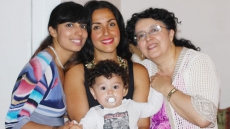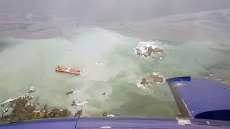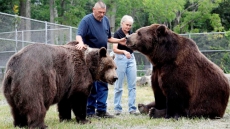VANCOUVER — Sarah Blyth was weary of rushing to counteract an overdose every time someone screamed "Narcan!" from a nearby alley in Vancouver's Downtown Eastside, so she joined other activists to set up a supervised drug-consumption tent for addicts.
Blyth acknowledged the so-called pop-up site is illegal, but said she couldn't stand by and watch as people overdosed in what she said is one of the most popular back alleys in the impoverished neighbourhood for drug use.
"We're just trying to help," said the former mental health worker who oversees a market space behind the small drug-consumption site where she volunteers. "It would be great if it wasn't needed. But it is."
The tent includes a half-dozen folding tables and various supplies including syringes, gloves and the overdose-reversing drug naloxone, known commercially as Narcan. It's located around the corner from Insite, North America's first legal supervised-injection site.
The tent gives people who, for whatever reason, won't visit Insite and still want a place that is comfortable and safe to use their drugs and where someone can keep an eye on them in case of an overdose, said Blyth, who is among the volunteers trained to use naloxone.
The pop-up facility operates 10 hours a day, and Blyth estimated it has served about 100 people daily since opening around Sept. 21.
The site is technically illegal, though Blyth said police have not intervened.
"It's one thing to hear about it or read about it in the newspapers. It's another thing to see it firsthand," she said of overdoses.
The City of Vancouver said in a statement that while it supports efforts to save the lives of drug users, the alley facility is neither sanctioned nor connected to the city.
Anna Marie D'Angelo, a spokeswoman for Vancouver Coastal Health, said the overdose-management site and its operators aren't connected to the health authority.

"We can't fault their intentions but we can't support or condone it," D'Angelo said Thursday. "It's not legal."
Vancouver Coastal Health announced last month it intends to open at least four safe-injection sites in the region to respond to an escalating number of overdoses, often involving the pain killer fentanyl.
Joel Nichols and Robin Wolfe use crystal methamphetamine and said they've been visiting the tent site since it opened.
Wolfe described the space as more welcoming than Insite, adding she couldn't visit the official safe-injection site because it only allows drugs consumed by syringe and that she smokes her drugs.
"It's a lot safer for me to come here" compared to being on the streets, she said, warming the bottom of a glass pipe containing a brownish liquid.
Nichols uses a needle to take drugs but said he still prefers the tent site.
"I don't know why I prefer it," he said, shrugging. "I just do." His hand trembled slightly as he inserted a needle into a bloodied area of his right forearm and thumbed down a plunger, injecting half a syringe of brown fluid into his body.

Janet Charlie was volunteering in the market on Aug. 24 when she heard her 26-year-old son Tyler had overdosed on fentanyl just around the corner.
"Somebody came and says your son just collapsed. It doesn't look like he's going to make it," Charlie said. "I ran up there and he was fighting for his life."
He died in hospital a week later.
Charlie said she now volunteers at the market as a way of dealing with her grief.
"Too many people are dying down here. I wish I had this (site) when my son was alive."




